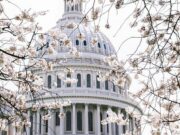A group of citizens speaking out on local issues that matter to their community.
What could be more American than that?
Unfortunately, in Kansas, this expression of basic civic engagement can lead to fines and the threat of jail time. That’s what the grassroots group Fresh Vision OP (as in “Overland Park”) found out the hard way.
When James Muir and his neighbors formed Fresh Vision, they never imagined that exercising their First Amendment right to free speech by advocating for their community could put them in legal jeopardy. “We’re a group of concerned neighbors who invested a little more than $3,000 to maintain our quality of life in South Overland Park,” says Muir, the organization’s president. The organization pursued those aims by supporting small businesses, maintaining safe neighborhoods, and promoting responsible development.
Indeed, Fresh Vision makes no secret of its goals. A glance at the organization’s website reveals that its mission is “seek[ing] to preserve the quality of life in our unique neighborhoods while supporting the growth of small local businesses, maintaining safe neighborhoods and promoting responsible development” in the Overland Park area.
That mission seems straightforward enough. And, while voicing opposition to “chip-seal” roads and objecting to placing tolls on a nearby highway appear to be ordinary local politics at work, the group also advocated for and endorsed Dr. Faris Farassati’s election as mayor of Overland Park, believing his proposed policies and views would further Fresh Vision’s mission.
When Fresh Vision made that endorsement, Kansas officials came knocking. “We were immediately classified as a Political Action Committee and sent a demand for a list of all those who contributed to Fresh Vision OP,” Muir recounted in testimony before the State of Kansas Legislative Elections Committee. “We responded that we were not a Political Action Committee and were, in fact, a 501(c)(4) Social Welfare Organization with the proper IRS filings. We were met with demands for the PAC filing or action would be taken against us personally.”
Specifically, the government threatened Fresh Vision’s officers with tens of thousands of dollars in fines and imprisonment if they didn’t register the group as a political action committee and disclose its donors and internal financial operations.
Yet, Fresh Vision is far from the type of group ordinary people would think is involved in elections. They make it abundantly clear that they are a “non-partisan group of neighbors seeking transparency and accountability with how our tax dollars are spent,” and that Fresh Visions supports “qualified candidates, Republicans or Democrats, who have the best interests of our fellow residents at heart.”
But that simple endorsement implicated some troublesome—and unconstitutional—provisions of Kansas law.
The first is the definition of “political committee.” State law improperly extends this definition to groups for whom “influencing elections” is only an incidental purpose of its activities, rather than a group’s major purpose.
This means that an organization like Fresh Vision—whose major purpose is clearly preserving the quality of life in and around the Overland Park area—can suddenly find itself subject to all of the onerous rules and time-consuming requirements that a true political committee must endure.
While some regulations make sense for groups established to promote the election or defeat of candidates, a group like Fresh Vision is barely involved in electoral politics at all. Fresh Vision’s only connection to such politics is to occasionally identify a candidate as supportive of policies that align with the group’s core mission. In this way, the law unconstitutionally targets organizations that aren’t truly involved in electoral politics.
There is a second flaw in the Kansas law. The state has an extremely low $100 threshold for triggering burdensome registration and reporting requirements. Failure to comply with these requirements can result in penalties that include huge fines and even jail time.
What this means is that even something simple like a single mailer or a few yard signs could easily surpass the threshold, effectively transforming a small group of citizens into a political action committee as far as the state is concerned.
Muir was also frustrated by the lack of due process he and Fresh Vision experienced. “We were not given the basis for the PAC determination, nor an explanation as to why we were a PAC under the Kansas State Statutes. What we were given was a notice of a hearing where we could each be subject to a $5,000 fine.”
At the hearing, Muir said the group was “cut off, talked over, and treated as meaningless individuals. We were scolded for even wasting their time by bringing the matter to a hearing. We were given the option to make the PAC filings within 30 days or face a fine.”
“Many times, Commissioner Solbach would not allow us to speak, even though we were representing ourselves,” added Chengny Thao, another member of Fresh Vision OP who experienced frustration with being targeted, as she testified before the Kansas Legislative Elections Committee. “Clearly, the Kansas Governmental Ethics Commission made their ruling prior to our hearing. They wanted to send a message they are the judge, jury, and executioner.”
Thao elaborated, “At the beginning of the hearing, I asked Commissioner Solbach if Mark Skoglund, the Executive Director, was a licensed and practicing attorney. I asked this question because Mark did not appear to be knowledgeable with the basic laws of a 501(c)(4) vs PAC even though he filed a complaint against us.”
Facing potentially ruinous penalties and fearing another enforcement action, Fresh Vision made the difficult decision to suspend its activities. “We are now the poster child of what needs to change with regards to the Kansas Ethics Commission,” Muir lamented.
Now, with the help of the Institute for Free Speech, Fresh Vision is going to court to protect the rights of all Kansans. “We merely wish to exercise our right to speak out about local issues that affect the Overland Park community,” Muir said. “Kansas’ current campaign finance laws have made that simple goal too risky to pursue.”
“The First Amendment will not allow bureaucrats to use arcane regulations to punish regular citizens who simply want to voice their concerns about development, water use, and other local issues,” said Institute for Free Speech Senior Attorney Charles “Chip” Miller. “Norman Rockwell’s classic paintings beautifully captured how everyday Americans engage their local governments. We will make sure that picture never changes.”
“I was taught by my parents to stand by my principles—no matter the cost,” Muir reflected. “It is your principles which make you who you are as a person.”
For Muir, Thao, and Fresh Vision, that means fighting for the right to participate in local democracy without fear of prosecution. This lawsuit is about eliminating the uncontrolled power of a state administrative agency and placing that power back with elected representatives—where it belongs.
Advocating for the preservation of local quality of life shouldn’t be against the law.
The Institute’s lawsuit on behalf of Fresh Vision seeks to make sure that it isn’t.
To read a full press release on the filing of the lawsuit, click here. To visit the case page and learn more, click here.














